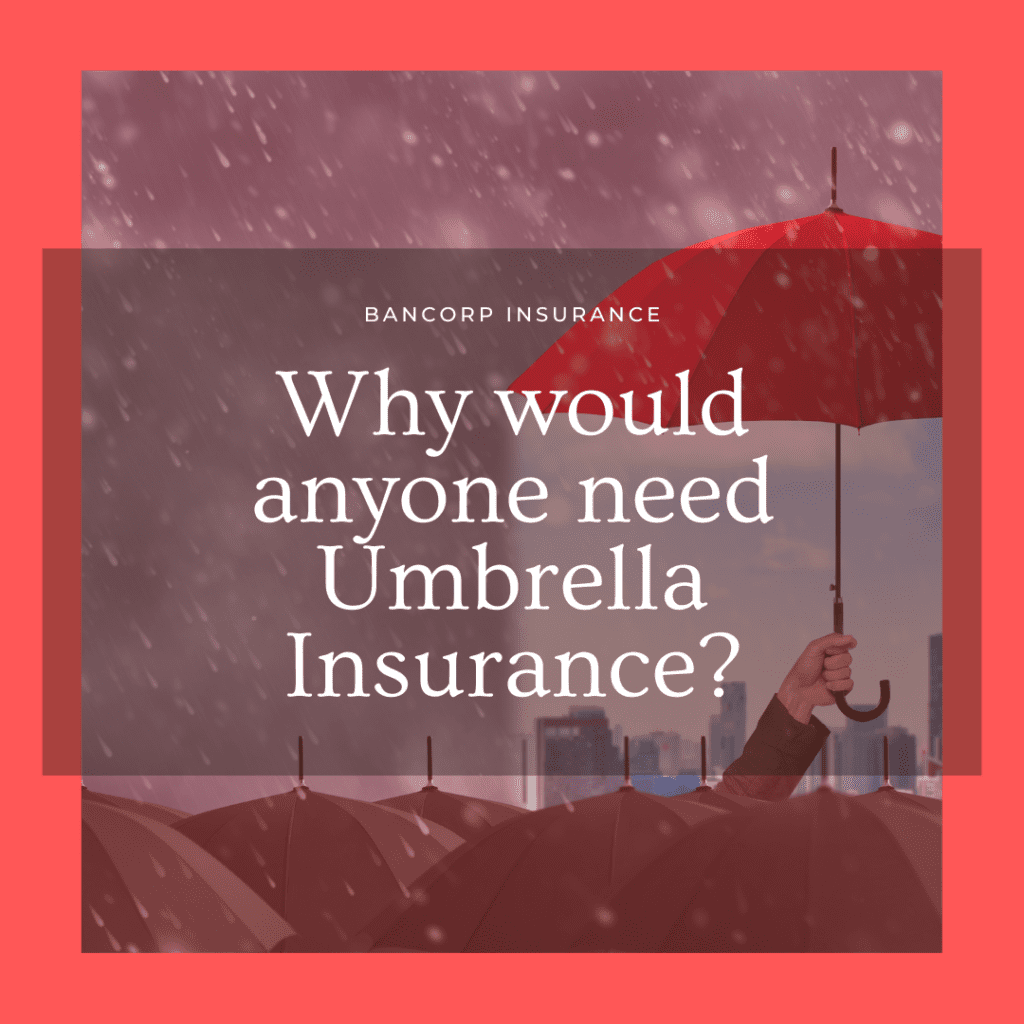Why would anyone need Umbrella Insurance?

Clients and friends ask me this question all the time. I know what they are thinking, “is my insurance agent just trying to get me to buy more insurance, do I really need Umbrella Insurance?” It’s a valid question and one worth asking. Like many things in this life the question cannot really be answered unless we look at who is asking the question. Let me ask you a couple of questions.
Do you own your home?
Do you own two or more cars?
Do you have a boat or jet skis?
Do you have a recreational vehicle?
Do you own a business?
Do you own rentals?
Do you car pool for work, or run your kids or someone else’s kids to school, scouts, sports etc.?
Do you have a teen driver?
Are you a gun owner?
Will you continue to earn a wage over the next 5 to 10 years?
Is your total net worth over $500,000?
If you can answer two of the above questions with a yes answer, you need an umbrella policy.
What Is Umbrella Insurance?
An umbrella policy, also called “excess liability” coverage, is a form of liability insurance that supplements your auto, home, or renters’ standard policy. “Liability” refers to situations where you are sued and held responsible for property damages or bodily injuries to another party.
Umbrella policies cover a higher liability limit, usually a minimum of $1 million. For your home/renters or auto insurance, umbrella will cover the same sorts of liabilities at a higher coverage. For example, it will cover a third-party’s damages and injuries if you are responsible for an auto accident, or it will pay someone’s medical bills if they are injured on your property.
But umbrella insurance is also special in that it covers a broader form of liability as well. For example, it will even cover your legal fees (whether or not you are found at-fault), false arrest, libel, slander, dog bites, and responsibility while volunteering.
You need to ask a lot of questions when you buy “Umbrella” insurance. Many insurers only sell a follow form Excess Liability policy. An Excess Liability policy is not Umbrella insurance. Excess Liability forms provide you with less coverage than the traditional Umbrella policy. By the way, insurers know you won’t know the difference. They are more than happy to protect themselves from potential losses versus covering your liability exposures.
What Is the Difference Between Follow Form Excess Liability and Umbrella Insurance?
Both policies will give you additional liability limits above your current policies. A Follow Form Excess Liability form is just what it says it is. It will provide you additional liability coverage over the primary insurance coverages you currently have, in short it will follow the current primary insurance form. If you have an auto insurance policy and your liability limits are $500,000 and you buy a $1,000,000 Excess Liability policy. You will have 1,500,000 in liability coverage. The same would hold true for your homeowner’s insurance.
If you do not own a boat and you go to the lake and decide to rent a boat and you get in a boating accident your Excess Liability Coverage will not cover you because you did not have boat policy for it to follow. You did not own a boat, so you would not have bought a boater’s insurance policy.
Spoiler Alert: If you had purchased Umbrella insurance for $1,000,000 and you had the same boat accident your Umbrella insurance would act as your primary liability coverage even though you did not have a boat policy at the time. Umbrella policies do not need to follow a form. This will follow through if you rent a motor home for vacation with the family, a skidoo, a motorcycle, on and on.
Can umbrella insurance cover landlords?
Yes! Umbrella insurance is a great investment for landlords with one or many rental properties. As a landlord, you are responsible or the health and safety of your tenants and their guests. Umbrella policies will help raise your liability limits in the case that something happens on your rental property that is completely or partially your fault.
Scenarios where umbrella insurance would cover you as a landlord:
A tenant or guest is injured in a communal area, like a gym, lobby, staircase, or patio
A third party sues you for damages your tenants cause
A former resident breaks into the apartment because you didn’t change the lock
A tenant sues you for wrongful entry or invasion of privacy
Your rental property is vacant and someone (neighborhood kid or squatter) is injured while on your property
Someone is injured with your property in the rental, like if you neglected to care for the stove
You are sued and have to pay your legal defenses, whether or not you are found at fault
The most common claim that landlords see is the “staircase fall.” If a handrail is broken, carpet is loose, or a step is uneven, your tenants or guests could trip and fall on the stairs. Even a small injury could result in major fines, as it’s your responsibility to care for and manage communal areas (unless otherwise specified). You want to ensure that you keep staircases to code, shovel and salt icy walkways, and have sturdy handrails available to prevent trips and falls on your rental property.
Note: We generally recommend that landlords require their tenants to hold renters’ insurance. This ensures your tenants are also protected against liability, and you aren’t stuck with the bill for an entire claim.
What does umbrella insurance not cover?
Here’s where the line gets a little fuzzy. Most personal umbrella policies will not cover liability incurred in business or professional activities. This requires business liability insurance. So, if you run your rental property under a separate business or LLC, your personal umbrella policy (attached to your home or auto insurance, for example) may not be applicable.
Bancorp’s insurance agents are available to provide you with a free review and consultation. Contact Us – Bancorp Insurance Call 800-452-6826 or book an appointment with an agent.
Disclaimer: This content is provided for general information purposes and is not intended to be used in place of consultation with our agents.



